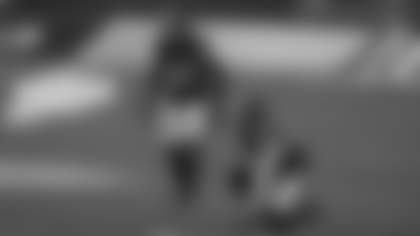Let's get to it:
TOM GARRETT FROM MOON TOWNSHIP, PA: What was the atmosphere like Sunday at Heinz Field? It seemed on television that the few fans there were loud and boisterous (no surprise there with Steeler fans). It seemed the players were real appreciative of having at least some fans back to cheer them on.
ANSWER: It was nice to have some fans in the stadium, and the players seemed to appreciate their presence and enthusiasm. But when you're used to 65,000 people, having 5,000 in the building is quite a difference. But such is the time in which we're living right now.
TOMMY JAMES FROM GILBERTSVILLE, PA: Does the mandatory five-year retirement period to be eligible for the Pro Football Hall of Fame apply to everyone? If I recall, Chuck Noll was elected to the hall of fame within a year or two after he retired.
ANSWER: Chuck Noll retired in 1992 and was part of the Pro Football Hall of Fame's Class of 1993, and at that time the mandatory waiting period for coaches was only one year. But that rule was changed subsequently to five years to match the rule applying to players to account for coaches who announce their retirement and then return to take another job in coaching, as both Bill Parcells and Dick Vermeil did.
ANDREW SCHERBIK FROM CHESAPEAKE, MD: I know it's way too early in his career to make an accurate assessment, but when you look at Chase Claypool, what stands out about him and makes you think that he has the potential to be special?
ANSWER: General Manager Kevin Colbert talks about the evaluation process and how the most difficult elements to assess are "hearts and smarts," and by that he means a prospect's intangibles and intelligence. Ben Roethlisberger often has spoken about Claypool's football intelligence and how he never makes the same mistake twice and always seems to be on top of his playbook. As for Claypool's heart, the Steelers got some insight into it by seeing that even though he was a star at an iconic program such as Notre Dame he didn't consider in beneath him to contribute on special teams. And not only was he willing, but he took pride in it and was good at it. Coach Mike Tomlin often tells players, "I know what you're capable of, but what are you willing to do?" Claypool is capable, he has a high-end skill-set, and when he's asked to be a gunner on the punt team or cover a kickoff, he accepts the assignment, gets down the field, and makes the tackle.
KEN WALDROP FROM ONTONAGON, MI: Can we please, please stop using Diontae Johnson on special teams? Ray-Ray McCloud would like the work, and it would be nice to have Johnson, Claypool and Washington all play a whole game together.
ANSWER: If I'm going to endorse removing Diontae Johnson as a returner, it would be because there is a better option available, not because I'm afraid he'll be injured. I like Ray-Ray McCloud's burst on special teams, but he also looked pretty good on that reverse he ran for 58 yards against the Eagles. Does that mean McCloud can't play special teams now either?
MATTHEW BARISH FROM LAKE HAVASU CITY, AZ: I was confused by the catch in the third quarter by Chase Claypool that was overturned on replay. He clearly got his right foot inbounds but not his left. However his left foot would have been inbounds if the defender's leg had not been underneath his foot. Is it really the rule that a foot kept up by the defender is not counted as inbounds? What would stop a defender from holding a receiver's foot up with a hand or any other body part to prevent him from landing inbounds? If that truly is the rule, why don't the Steelers defenders try to utilize it more?
ANSWER: The rule is that a receiver must get two feet or another body part down inbounds before going out of bounds to complete the catch. If Chase Claypool had come down with a knee inbounds, or a shoulder inbounds, it wouldn't have mattered that the defender's leg was preventing his second foot from coming down inbounds. And you do realize that in real life, which is where the Steelers defenders would be trying to utilize this technique of getting a leg under the foot of a receiver to prevent a legal catch, things don't happen in super-slow motion. In real life, that whole sequence takes less than two seconds to happen, and so you really can't be asking me why a defender can't get a leg under the foot of a receiver to prevent a legal catch, right?
SEAN FREDERICK FROM SOUTH BEND, IN: Watching games on television and seeing terrible officiating and then watching the replays and knowing how bad the call was can really ruin the experience. Is there any merit to having an official in the booth who watches the live broadcast and then is able to "challenge" a potential bad call? I am not saying the official can call penalties, they can just give their opinion as to what they (and those watching) saw.
ANSWER: Your intent may be pure, but all this does in real life is add another layer of bureaucracy to the process. If seven guys on the field are unable to get the calls correct, why would adding another of the same group suddenly make it better? And what if the added guy in the booth comes to like his job and decides that in order to keep this job he likes he needs to make an impact? Then he starts inserting himself into situations where it would have been better if he just butted out. The answer is better caliber of officials, not adding more mediocre/incompetent ones to the process.
MATHEW McKENNA FROM BROOK PARK, OH: What exactly is the rule on what is a catch, and why does it seem to change when the Steelers play?
ANSWER: It doesn't matter what the rule is, because officials will call what they want to call, and there is enough gray area in the rulebook and judgment built in to justify any decision. The Steelers have 20 sacks and 50 pressures so far this season, and not A SINGLE holding penalty has been called on any of the offensive linemen assigned to protect the opposing quarterbacks over the first four games. Do you think it actually matters what constitutes holding according to the rulebook, or do you think it's just what they want to call or don't want to call? I know what I think on this subject.
GREG PARSONS FROM MOUNT LAUREL, NJ: Is Joe Haden leading the league in pass interference penalties this year?
ANSWER: Are you referring to actual, legitimate pass interference penalties, or the ones called to keep the score close?
TOM McCORMICK FROM FINDLAY, OH: On the diamond formation where Chase Claypool scored after a quick pass to the sideline, the Eagles defense seemed to be calling for a penalty flag. I assume they thought it was some sort of illegal formation. Can you elaborate on why it was legal and/or why you believe the Eagles were calling for a flag?
ANSWER: It was legal because nobody was lined up offside, there weren't too many or too few men in the backfield, and nobody was improperly covered up in the formation. That's why it was legal. Why the Eagles players were moaning for a penalty flag is because in today's NFL players on both teams are always moaning for a penalty flag. Just because somebody is trying to influence an official doesn't mean there is just cause for that official to react.













